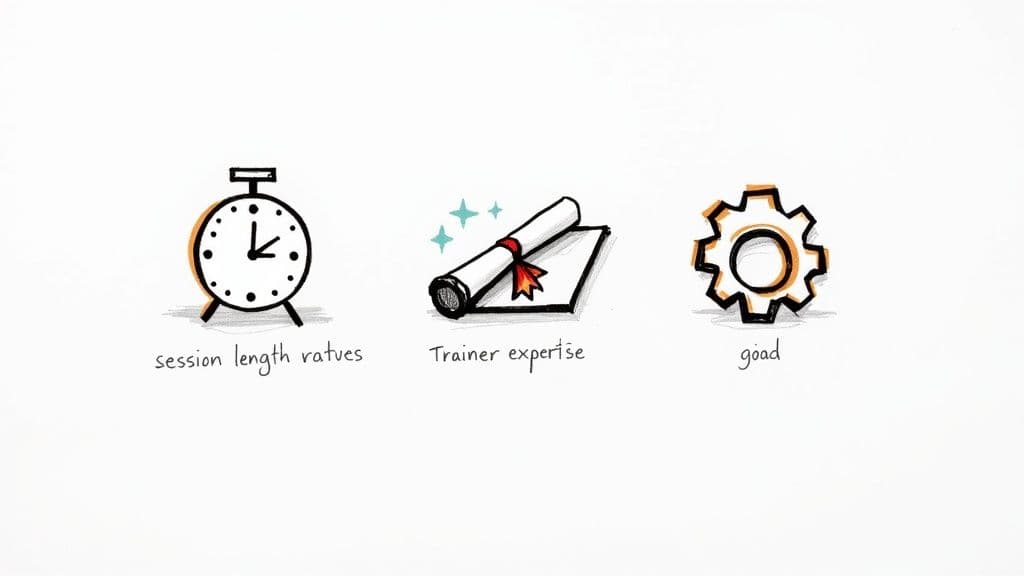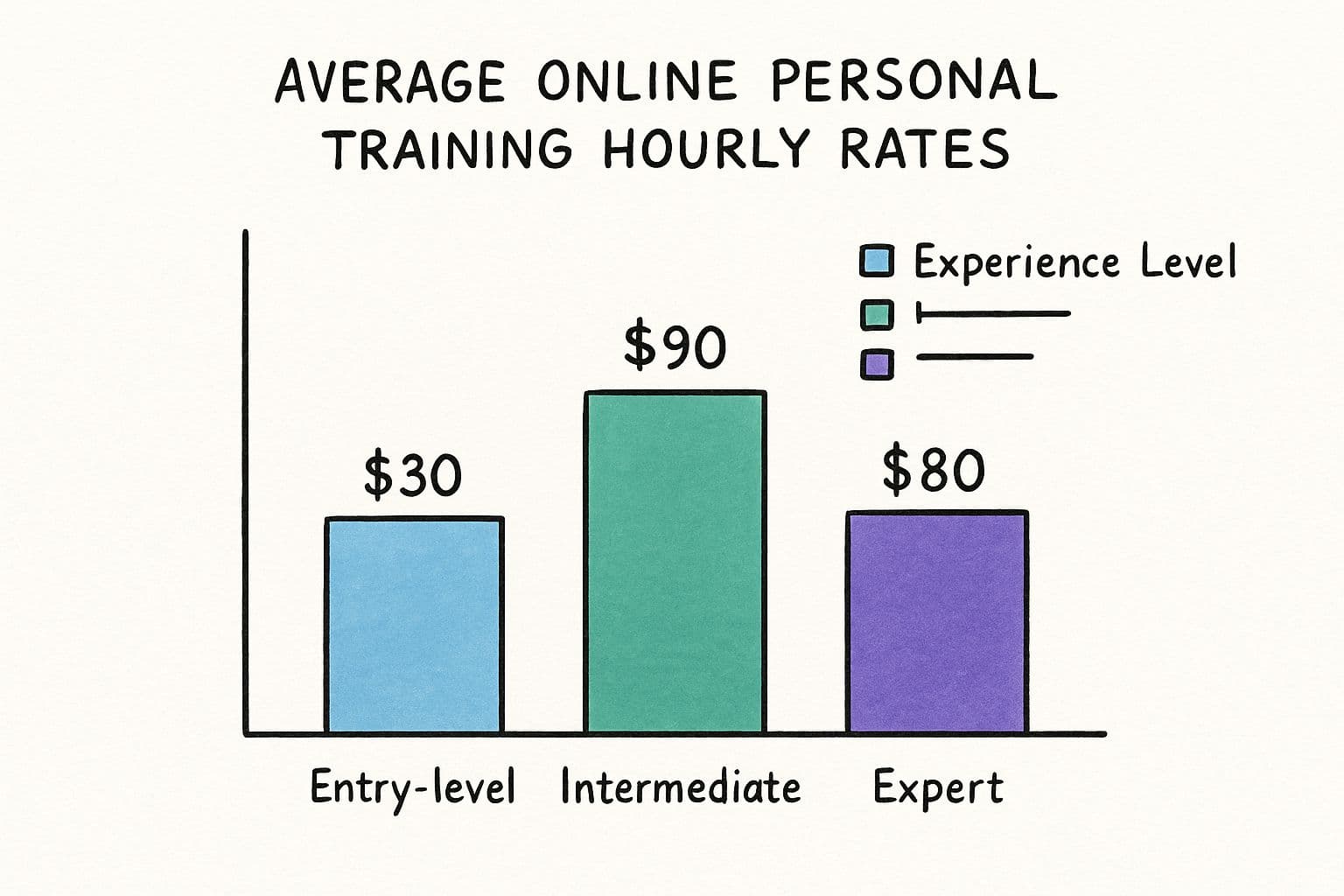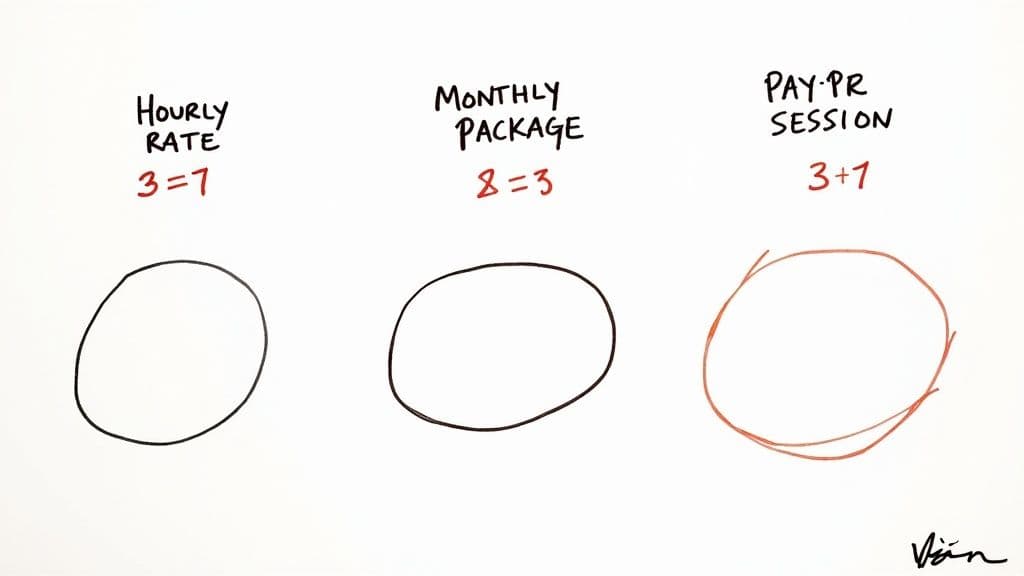Right then, let's talk brass tacks. How much is this actually going to set you back?
When you start looking, you’ll see that online personal training rates in the UK typically fall somewhere between £30 and over £250 a month. The final number on the invoice really just depends on how much hand-holding you need, how often you can get your coach on the line, and what other goodies are bundled in.
What Do Online Personal Trainers Actually Cost in the UK?
Let's cut through the noise and get straight to the numbers. Figuring out what to expect financially is the first, and maybe most important, step in finding a coach who's right for you. The market's huge, with something for pretty much every wallet.
Think of it like booking a holiday. You could grab a self-catered apartment (that's your budget-friendly app subscription), book an all-inclusive resort (a mid-range plan with regular check-ins), or go for a fully bespoke luxury tour (premium one-on-one video coaching). Each one offers a different experience for a different price.
A Quick Look at Price Brackets
To make sense of the costs, it helps to break them down into a few common tiers. This way, you can see exactly what you're getting for your money and match your budget to your fitness goals. And make no mistake, the demand for these services is exploding.
The online personal training market in the UK is growing faster than the entire fitness industry. It’s a huge shift, showing just how many people now prefer virtual coaching for its convenience and personalised touch.
This isn't just a small trend. The UK's personal training industry is valued at a whopping £631 million, and the online bit is set for some serious growth. This digital boom is making top-tier coaching more accessible than ever before. If you're curious, you can read more about these personal training software statistics to see just how fast the industry is changing.
So, here’s a rough guide to what you can expect to pay and what you'll get for it.
Typical UK Online Personal Training Rate Tiers
We’ve put together this table to break down the common price brackets. It shows you what’s usually included at each level, so you can see where your budget fits in.
| Price Bracket (Monthly) | Service Level | What's Usually Included | Best For |
|---|---|---|---|
| £30 – £75 | App-Based & Template | Generic workout templates, occasional group Q&As, basic app access. | Self-motivated individuals who need structure but little direct supervision. |
| £75 – £150 | Hybrid Coaching | Personalised workout plans, monthly or bi-weekly email/message check-ins, nutrition guidance. | Those needing accountability and a customised plan without constant contact. |
| £150 – £250+ | Premium & Bespoke | Fully customised programming, frequent one-on-one video calls, daily messaging support, detailed form analysis. | Beginners, individuals with specific goals or injuries, or anyone needing maximum support. |
Ultimately, the right tier for you comes down to what you need. Are you a self-starter just looking for a solid plan to follow? Or are you starting from scratch and need someone in your corner every single day? Knowing the answer to that is half the battle.
The Key Factors That Drive Online Trainer Prices

c29a10b9-75b6-46bf-9879-ef736d2a0241.jpg
Ever scroll through Instagram and see one online coach charging £50 a month, while another with a similar vibe asks for £300? It’s not just random. There are real, tangible reasons behind those numbers, and knowing them helps you figure out what you’re actually paying for.
Think of it like hiring a designer. A junior using a pre-made template for your logo will be worlds cheaper than an experienced branding pro who builds your entire visual identity from scratch. It’s the same deal in fitness coaching. Price usually signals the depth of expertise and how bespoke the service truly is.
Experience and Qualifications
This is one of the biggest drivers of price, and for good reason. A freshly qualified PT might offer lower rates to build up their client roster and get some wins under their belt. Nothing wrong with that.
But a coach with a decade of experience, a wall of client transformations, and a deep understanding of what actually works can (and should) charge a premium. Their qualifications matter, too. A standard Level 3 Diploma is the baseline, but the best coaches never stop learning.
A trainer holding advanced certifications in specialist areas like pre-and-post-natal fitness, sports nutrition, or injury rehab brings a whole other level of expertise. That specialist knowledge is an asset, and it naturally bumps up their rates.
This extra training means they can handle more complex situations safely and effectively. If you have specific needs, paying for that expertise is money well spent.
Level of Personalisation and Support
Okay, this is arguably the most important factor for you as the client. The level of personalisation is what separates a generic PDF from a truly transformative experience, and it’s a huge reason for the price gap.
A cheaper service might give you a slightly tweaked template. It’s a plan, but it wasn’t built just for you. A premium service is the opposite: the coach builds your workout and nutrition plan from the ground up, factoring in your lifestyle, what you actually like to eat, and your feedback week to week.
Communication is the other half of this equation. It usually breaks down like this:
- Basic Tier: Maybe a weekly or fortnightly email check-in.
- Mid-Tier: You'll likely get regular messaging support through an app.
- Premium Tier: We're talking daily messaging access and scheduled video calls for live form checks.
The more access you have to your coach for accountability and real-time tweaks, the more you can expect to invest.
Technology and Business Costs
Finally, the behind-the-scenes stuff influences the price tag. A coach who just emails you a PDF has pretty low overheads. One who invests in a slick, all-in-one coaching app with video exercise libraries, progress tracking, and in-app messaging has higher costs.
Those platforms aren't free for the trainer, and that cost gets factored into their rates. But while it might nudge the price up, a great app can make your experience a million times better.
Beyond the tech, trainers have other real-world business expenses to cover—things like insurance, marketing, and continuous professional development. All of it gets built into their online personal training rates. Setting prices is a balancing act, and smart coaches learn how to structure their offers effectively. For any coaches reading this, getting to grips with a solid subscription pricing strategy is a game-changer.
What's Your Online Coaching Style?
Not all online coaching is built the same. The way a trainer actually delivers their service is one of the biggest things that sets their online personal training rates, so you need to understand the main models to figure out what works for your budget and your goals.
Think of it like learning guitar. You could download a self-guided app, sign up for a weekly group class, or hire a private tutor for one-on-one lessons. Each one has a different price tag, level of attention, and learning pace. Online fitness coaching is exactly the same.
The Self-Starter Model: App-Based Programmes
The cheapest way to get started with online training is usually through an app-based programme. These are brilliant for self-motivated people who just need a solid plan to follow and a bit of structure. You'll typically get pre-designed workout routines, an exercise library, and maybe some basic nutrition guides.
The catch? For the lower cost, you get almost zero personalisation. Support is usually just a community forum or the odd group Q&A. It's the "self-catered apartment" of online fitness—you get the kitchen and the ingredients, but you’re cooking the meals yourself.
The Accountability Model: Hybrid Coaching
The next level up is hybrid coaching, which mixes automated plans with actual human check-ins. This is a super popular middle ground, giving you a great balance of support and affordability. You get a programme that’s more tailored to you, plus regular accountability from your coach, usually through weekly emails or in-app messages.
This model is a fantastic fit for anyone who needs that extra nudge and more customisation than a generic app can provide. It keeps you on track without the hefty price tag of constant one-on-one access.
Choosing a coaching style is really about matching the service to your personality. If you thrive on accountability and personal feedback, a hybrid or bespoke model will give you way better results than a generic app. That makes the higher rate a worthwhile investment.
This infographic shows how a trainer's hourly rate usually lines up with their experience, which then shapes the kind of service they can offer.

7f09bf2a-7376-41d9-a7aa-fbca695e57c4.jpg
The data is pretty clear: as a trainer gets more experienced, their average hourly rate goes up. This reflects the deeper expertise and higher-touch service they're able to provide.
The Premium Model: Fully Bespoke Coaching
At the very top, you've got fully bespoke one-to-one coaching. This is the "private tutor" experience, giving you the absolute maximum in guidance, support, and personalisation. Your trainer builds your programme completely from scratch and tweaks it constantly based on your progress and feedback.
This premium service often includes things like:
- Live one-to-one video calls for real-time form correction.
- Daily or even unlimited messaging access for questions and motivation.
- Detailed analysis of your workout videos and food diaries.
This high-touch approach demands the highest online personal training rates, but it's priceless for beginners, people with complex goals, or anyone who wants an expert guiding every single step. This top-tier segment is a major reason the UK fitness market is booming. The personal training sector was valued at over £768 million in 2023 and is only getting bigger, with digital services taking a larger slice of the pie. You can dig into more of the numbers on the UK personal training market growth on Statista.
To make it easier to see how these models stack up, here’s a quick comparison. It breaks down the three main approaches to help you decide which one is the right fit for you.
Online Training Models Compared
| Model | Typical Cost | Level of Personalisation | Pros | Cons |
|---|---|---|---|---|
| App-Based | £15 - £50 / month | Low | Very affordable, great for self-starters, flexible. | Minimal support, generic plans, no accountability. |
| Hybrid Coaching | £75 - £200 / month | Medium | Good balance of cost & support, tailored plans, accountability. | Less 1-on-1 time, communication may be weekly. |
| Bespoke 1-to-1 | £250 - £600+ / month | High | Fully customised, maximum support & accountability, best results. | Highest cost, requires more commitment. |
Ultimately, the best model depends on your needs, personality, and budget. Whether you want a simple plan to follow or a dedicated expert in your corner, there's an online training style out there for you.
Calculating the Real Value of Online Training

af3b5289-1c5c-4cfc-8dd4-e4f82a61199f.jpg
So, is online personal training a smart investment or just another subscription fee quietly draining your bank account? To figure that out, you have to look past the price and work out its actual return. It's easy to put online PT rates next to a gym membership, but that’s like comparing a private tutor to a library card.
Sure, both are useful, but they offer completely different levels of service and, ultimately, different results.
The real value isn’t just about the workouts. It’s about buying back your time and energy. No more commuting to a gym; you get expert guidance from your living room. No more guessing which exercises to do; you get a structured programme designed to get you results, efficiently.
Beyond the Price Tag: A Strategic Health Investment
When you hire a great online coach, you’re not just paying for a PDF plan. You're investing in accountability, expertise, and consistency—three things that are almost always the missing ingredients in anyone's fitness journey.
A traditional in-person trainer might set you back £40-£60 per session. A weekly meeting could easily run you £160-£240 a month.
For that same price, and often less, a top-tier online coach provides support for the entire month, not just for one hour a week. This constant access for feedback and motivation is where the real change happens. It's the difference between getting a single lesson and having a mentor on call.
The most significant value of online coaching is access. You can connect with world-class specialists in nutrition, powerlifting, or pre-natal fitness from anywhere in the country, breaking down geographical barriers that once limited your options.
This access to niche expertise is priceless. For instance, a coach who is also a certified nutritionist can give you integrated fitness and meal planning. This holistic approach is almost always more effective, and you can see how professionals combine these skills from these insights from a certified nutritionist and personal trainer on comprehensive fitness.
The Real-World Return on Your Investment
Think about the cost of not hitting your health goals: low energy, rubbish sleep, and the risk of long-term health problems. A great coach gives you the structure and accountability to get past those hurdles. Many successful fitness pros build entire careers on this idea, turning their expertise into a livelihood.
For anyone inspired by this model, it’s worth checking out how to start an online coaching business to really get the value from the provider's side.
Consider this real-world story: a busy professional was struggling to find time for the gym, so they hired an online coach. The investment of £150 a month led to a structured 30-minute daily routine. The result? Better health, a noticeable boost in productivity at work, and more energy for their family.
So, was that £150 an expense? Or was it a strategic investment that paid dividends across every area of their life?
When you look at it through that lens, the right online personal training rates stop looking like a cost and start looking like one of the best investments you can possibly make in yourself.
Finding a Great Coach Without Overpaying

104439a0-b88e-4520-942e-b2ad7ed0d41b.jpg
Let's be honest, trying to find a good online trainer can feel like swiping through a dating app. Too many options, a lot of questionable profiles, and a real fear of getting catfished. So, how do you find a quality coach with fair prices and dodge the ones who talk a big game but deliver nothing?
Think of it like a pre-flight check. You wouldn't get on a plane without knowing it's safe, so don't commit your health (and your money) to a trainer without doing a little digging first.
Your mission is to find genuine value, not just the cheapest price tag. The first place to look? Professional bodies. The Chartered Institute for the Management of Sport and Physical Activity (CIMSPA) keeps directories of registered pros. It’s a solid starting point for finding trainers who are actually legit.
The UK fitness market is absolutely massive, projected to hit £6.5 billion in early 2025. More choice is great, but it also means more noise to filter through. With market penetration climbing to a record 16.9%, online training is a huge piece of that pie. You can get the full story in the UK Health & Fitness Market Report 2025.
Your Vetting Checklist
Before you even think about entering your card details, run every potential coach through this quick checklist. It’s your best defence against paying for a glorified PDF workout plan.
- Essential Qualifications: This is non-negotiable. They must have a Level 3 Diploma in Personal Training or an equivalent qualification recognised by CIMSPA. This proves they've got the foundational knowledge to not injure you.
- A Real Consultation: A good coach will want to talk to you for free first. They should be asking deep questions about your goals, health history, and what your daily life actually looks like. If their first move is to send a payment link, run.
- Social Proof That Isn't Fake: Look for real-world reviews and transformations. Be sceptical of accounts filled with nothing but polished, professional photos. You want to see genuine stories from real people talking about their journey.
- Specialist Expertise: Got a specific goal, like running a marathon or working around an old injury? Find a coach with extra certifications in that area. This kind of advanced knowledge is what justifies a higher price tag.
Red Flags to Watch Out For
Knowing what to avoid is just as important as knowing what to look for. If you spot any of these warning signs, it’s a hard pass. They’re usually a sign of a poor-quality service that isn’t worth a single penny.
A massive red flag is any coach who guarantees results. Think "lose 20 pounds in 30 days." Real progress is individual and never a sure thing. A pro sets realistic expectations; they don't sell you a miracle cure.
Also, be wary of trainers who are impossible to get hold of or who use high-pressure sales tactics to rush you into a decision. A good coach builds a relationship based on trust and support, not fear and urgency. After all, keeping clients happy is how they stay in business. You can see how the pros do this by learning about effective membership retention strategies.
By running through these checks, you can confidently sort the experts from the amateurs, understand what you're paying for, and find a coach who will be a genuine partner in your fitness journey.
Your Burning Questions About Online PT Costs, Answered
Alright, let's talk about the elephant in the room: the price tag. When you're looking to hire an online personal trainer, the costs can feel all over the place, and it’s natural to have questions. You want to make a smart investment, not just throw money at a PDF workout plan.
This is where we cut through the noise. I'm going to tackle the most common questions I hear about online PT rates, giving you the straight-up answers you need to pick a coach with confidence.
Let's clear up any confusion so you can get started.
Are the Cheaper Online Personal Training Programmes Actually Any Good?
They absolutely can be, but there's a catch. Cheaper plans are often brilliant for self-starters who just need a good, structured programme to follow. If you're disciplined and just want a solid map to get you from A to B, they can be a fantastic entry point.
But their effectiveness boils down to two things: the quality of the plan itself and whether you can stick to it without someone checking in on you daily. If you've got a history of injuries, super-specific goals, or you know deep down you need that motivational kick, a more personalised—and yes, more expensive—coach will almost always get you better results. It’s all about being honest with yourself and what you truly need.
What’s Actually in a Typical Online Personal Training Package?
Most packages, no matter the price, will give you a workout plan and some way to check in with your coach. But the devil is in the details.
- Standard Tiers: Think of this as the essentials. You’ll usually get a personalised programme for your goals, some general nutrition advice, and weekly check-ins, probably through an app or email.
- Premium Tiers: This is where the high-touch service comes in. We’re talking live video calls for form checks, unlimited messaging access to your coach for those "am I doing this right?" moments, mindset coaching, and a much deeper dive into your nutrition.
Before you sign up for anything, always ask for an itemised list of what’s included. A good coach will have no problem breaking down exactly what your money gets you. It’s a huge red flag if they can’t.
Knowing the exact deliverables helps you compare apples to apples when you’re checking out different trainers.
How Do I Know If an Online Trainer’s Rates Are Fair?
A fair price is a direct reflection of the trainer's expertise and the level of service you're getting. A coach with a decade of experience and specialist certifications who offers daily support is going to charge more than a newly qualified trainer offering a templated plan. And they should. You’re paying for their knowledge and their time.
The best way to gauge fairness? Do a bit of homework. Look up a few different trainers in your niche. Compare their qualifications, what they actually offer in their packages, and what past clients are saying. A price is fair when it feels right for the depth of expertise and the amount of personal attention you'll receive.
Can I Haggle on the Price?
While most top-tier trainers have firm prices, some have a little wiggle room, especially if you’re willing to commit. Instead of just asking for a discount (which can come off as a bit cheap), try a different angle. Ask if they offer a better monthly rate if you pay for a three- or six-month package upfront. This shows you’re serious and gives them the security of a committed client.
A lot of coaches also have different service levels. If their all-in premium package is out of your budget, don't be shy. Ask if they have a more basic option. You might find a hybrid model that gives you the core support you need and fits what you’re willing to invest.
Ready to turn your fitness expertise into a thriving business? MyMembers makes it easy to manage clients and payments, so you can focus on what you do best—coaching. Start monetising your Telegram community today at https://mymembers.io.
